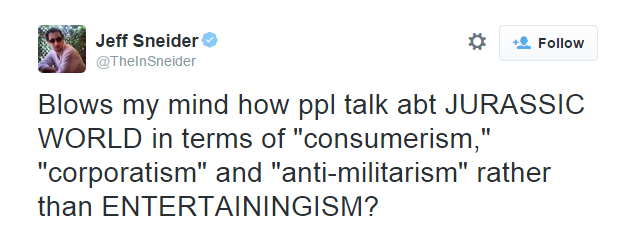
Critical thought does not have a minimum or a maximum. A blog post can rant about one scene in "Jurassic World" for 2,000 words, or a Twitter status can say that the whole thing is simply "good." But one thing that's very ill-advised to reject when digesting a film? The -isms. Including but not limited to: racism, sexism, capitalism, feminism, etc. If you can -ism it, it’s fair game when digesting a blockbuster.
Especially during the summer season, in which big, possibly dumb movies dominate cultural attention, the -isms have center stage importance. Narratively simple films may allow you to “turn your brain off," but within reason. Our favorite blockbusters do not come from the filmmaking stork, nor are they merely light shows with Hans Zimmer scores. They are a collection of specifically chosen images inherent with ideas, reflecting culture, hoping to create ideas, all within the cause of entertainment. It's a great thing; it’s art.
My words are in response to a staunch, non-trolling position of anti-critical thinking you may find anywhere. I found it in a Twitter post from self-designated non-critic Jeff Sneider. He's certainly entitled to his stance, but I'd like to touch upon how this is an overly-simple way of looking at big movies. This dangerous belief isn't avoiding overthinking so much as it rules out the reason why movies matter most.

First, let’s address the (white, male) elephant in the room. Disregarding ideas like sexism & feminism in a film is a bastardization of the biological truth that human beings watch the same thing differently—a concept that makes movies worth watching, and talking about. (If we all started seeing the same movies in the exact same way, that would be a nightmare, and I would personally bomb the polar ice caps so that global warming could just finish us off already.) However, some viewers are able to see films differently by looking past elements within them (such as sexism & feminism), and can more readily accept the images of these that may or may not be in “Jurassic World” as the sum of entertainment. Anyone can dive into a film as deep as they may like, but it is very counterproductive to reject the -isms, or the different ideas within them. To do so is a privilege. Some viewers go into a movie with the same standards of simple entertainment, but their experience is compromised by the very -isms within the film. They do not always have the same luxury to be detached from the images within their entertainment.
Aside from privilege, Sneider’s stance nudges towards a toxic selfishness to what greater good mass media can serve. Unless someone is deceased movie buff Kim Jong-Il, films aren’t made to satisfy the expectations of one person, with everyone else as an afterthought. “Jurassic World” is made for everybody, and everybody has the right to enjoy it. When someone is negatively affected by a representation or an idea within it that is not something that should be discouraged; for the sake of numerous ideas, and the people involved in them. If you agree that a certain cultural representation is a poor choice, it is an issue within the movie’s entire mission. This is all so that we can better understand the images that we consume, and to hold filmmakers accountable for their representations as justice to a greater good. (And if Joss Whedon and Cameron Crowe are any recent examples, filmmakers are reading the discussion, too.)
This has led to many recent societal embarrassments, across media forms devoured by viewers who want to keep analytical challenging out of their popular entertainment, but it especially shines in the unfortunate backlash against that upcoming, female-led “Ghostbusters” movie. As much as we create relationships with stories, our expectations do not create ownership of these characters. When director Paul Feig wants to make a “Ghostbusters” movie with funny people who happen to be women, bringing a few -isms right to mainstream audiences, that is not a step back in entertainment.
More than a half hour later after the first tweet, which was met with a mix of alarming and assuring peanut gallery responses, Sneider’s stance remained firm. Suddenly, it wasn’t just about issues that may affect viewers, but how movies should be viewed in general.

Going off this tweet, I am assuming that if we were at least talking about a film like “Do the Right Thing” here, the -isms would be more immediate in a discussion. Nonetheless, this seems to be an issue of entertainment vs. art, but the catch is that they’re not exclusive. One is not more worthy of critical thinking than the other. There should be no exception to movies regarding the thought capacity they deserve just because they are made for a mass audience. Representations of Scarlett Johansson in a franchise like Joss Whedon’s “The Avengers” films can have just as much of a cultural impact as those in Jonathan Glazer’s “Under the Skin,” regardless of their contrasting box office numbers.
The -isms are worth considering in criticizing entertainment because they are right in the story, in the very qualities that make a movie good or not. Ideas of feminism are upfront within "Mad Max: Fury Road," to the extent that a woman takes charge of a movie with a man's name in the title. Without such a significant -ism that defines the movie's narrative course, it would be a completely different film altogether. The quality within films is not always about why things are happening logically, but culturally. That’s even the case for movies with flame-throwing guitar warriors.
Outside of criticism, there are certainly filmmakers who simply desire to fulfill personal expectations of entertainment, like Michael Bay. A loud and proud Entertainingism kind of guy who really likes what he likes, and (especially in his “Transformers” blockbusters) uses his own privilege to blow past any worry about his images of sexism, racism, consumerism, militarism, etc. And yet, those elements are prominent within the way characters are presented to the audience, the amount of dialogue they are given, or how a Mountain Dew vending machine transforms into a killer robot. By focusing on entertainment first and only, Bay opens discussion on American culture, all within a franchise that inspired the title of Ebert’s third negative review compilation “A Horrible Experience of Unbearable Length.” Even Bay’s movies are not just shiny objects. Even if made with the wrong ideas, they are still infused with them.
There are great conversations to be found beyond pretending that films are only amusement park rides, where the goal is only to witness motion that you’re able to remove yourself from soon after. At the very least, entertaining the -isms is a great fun. Not only does it include joining cultural progress, but it’s a way to immerse yourself within something that you love; to chew on it to your personal logic’s content, but most importantly, to take films for what they are actually worth.
Nick Allen is the Senior Editor at RogerEbert.com and a member of the Chicago Film Critics Association.





